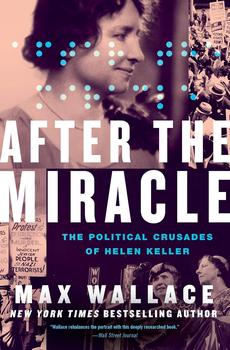Summary | Excerpt | Reviews | Beyond the Book | Readalikes | Genres & Themes | Author Bio

The Political Crusades of Helen Keller
by Max Wallace
Describing the increasingly unruly crowds, one of Laura's teachers, Mary Swift Lamson, lamented in her diary, "The crowd has become so great ... and presses so closely about Laura that we are obliged to surround her desk by settees, thus making a little enclosure and protecting her." We have little record of how Laura felt about being exhibited like a zoo animal, but Lamson recalled the bemused girl's reaction when she realized they had enclosed her off from the crowd. "Are ladies afraid of me?" she asked her teacher.
Howe's accounts of Laura's progress were careful to emphasize the qualities that he knew would capture the admiration of the adoring masses. Thus, he waxed eloquent about her strong moral character and impeccable table manners, along with her sewing skills and her delight in dressing and undressing her dolls. Meanwhile, there was no mention of the other qualities that were already being noted by her teachers— not always for the good—including her passionate views about the immorality of capital punishment and slavery. Having long since taken her place in the classroom with the other students, Laura was exposed to the well rounded curriculum developed by Howe, who believed that blind children should be exposed to a "new world of intellectual development" so that they could learn to live independently and support themselves in later life. Laura took to the lessons in natural history, mathematics, and geography and read voraciously from volumes of raised type that were the forerunners of braille.
Observing that, as a teenager, Laura had become a supporter of the Free-Soil Movement, which was formed to oppose the expansion of the slave trade to the western states, her teacher Mary Swift Lamson noted in her diary, "It was with difficulty that I convinced her that a man might have some good qualities even though he were a slave-holder."
Before long, reports emerged that little girls throughout America were poking their dolls' eyes out, tying them with green ribbon, and calling them "Laura." Many chroniclers have tried to make sense of the phenomenon. What was it about the girl that had struck such a chord? "Laura Bridgman became what the public wanted," social historian Rosemary Mahoney explains. "An idealized, sentimentalized symbol of suffering tempered by goodness and hard work. She was an example of the power of the human spirit to overcome adversity."
Howe was fond of boasting that Laura had become the second-most-famous female in the world, after only Queen Victoria— one of his few claims about the girl that may not have been exaggerated. Indeed, her fame had quickly spread beyond the United States and nowhere more so than England, where newspapers and magazines breathlessly repeated Howe's accounts.
Among the many visitors who flocked to meet Laura over the years were countless celebrities of the era, so the visit of Charles Dickens to Perkins in January 1842 may not have aroused the same level of excitement that it otherwise might. The celebrated British author had just arrived for his much-anticipated first visit to America. He was only thirty years old but was arguably the western world's most famous novelist of the time, thanks to the acclaim of books such as Oliver Twist, Nicholas Nickleby, and The Pickwick Papers. The stated purpose of his trip was to compare American democracy to the class divisions of Victorian England that he abhorred. He could have logically chosen Washington or New York as the starting point for his explorations, but he had long since made up his mind about which of America's famous attractions would be first on his itinerary. At noon on January 29, he paid a visit to the Perkins School for the Blind to see the girl he would describe as a wonder on par with Niagara Falls, in a travelogue he later published about his trip called American Notes.
Most of the chapter recalling Dickens's visit to Perkins merely reprints Howe's description of Laura's education taken from the school's annual reports. He closes his account by sounding a somewhat mawkish clarion call— as if to dare the reader not to be moved by the profound significance of Laura's achievement:
Ye who have eyes and see not, and have ears and hear not, ye who are as the hypocrites of sad countenances ... l earn healthy cheerfulness and mild contentment from the deaf and dumb and blind. Self-elected saints with gloomy brows, this sightless, earless, voiceless child may teach you lessons you will do well to follow. Let that poor hand of hers lie gently on your hearts.
When American Notes was published in October of that year, it only served to heighten Laura's celebrity in America and abroad. Little could she know that his widely read account would one day play a role in relegating her story to obscurity, in favor of another deafblind girl who would replace her in the public imagination.
Excerpted from After the Miracle by Max Wallace. Copyright © 2023 by Max Wallace. Reprinted with permission of Grand Central Publishing. All rights reserved.
Your guide toexceptional books
BookBrowse seeks out and recommends the best in contemporary fiction and nonfiction—books that not only engage and entertain but also deepen our understanding of ourselves and the world around us.